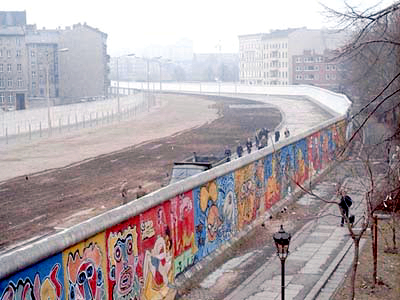Let’s Move On from the Cold War
Posted on July 28, 2016

By Noir at the German language Wikipedia, CC BY-SA 3.0, https://commons.wikimedia.org/w/index.php?curid=1402275
I wrote one of my most popular blog posts five years ago. I titled it, “Collapse of the Cold War Consensus.”
Here is an excerpt:
It took a while, but the Cold War consensus is finally shattering.
The Cold War consensus centered around a basic proposition: America was going to both pay and provide the military might to insure the national security of the free world.
America founded NATO as the alliance to promote that security and Congress paid for a national security establishment that guaranteed the dominance of American troops.
That Cold War consensus obviously started at the conclusion of the Second World War, survived both Korea and Vietnam, teetered a bit during the Carter years, and then came back strong during the Reagan years. After the Soviet Union fell apart, it took a while for the Cold War consensus to gain its bearings and its true raison d’etre.
The collapse of Yugoslavia gave the Cold War consensus a shot in the arm, as NATO rushed to the rescue of the Serbian Muslims. George Bush browbeat the alliance in helping with the War on Terror, as the Cold War consensus stretched beyond its natural life.
The war on terror is winding down. We will be out of Iraq before the next election and we may be out of Afghanistan if Congress has anything to say about it.
Secretary Gates just returned from a whirlwind trip, where he basically told the NATO member countries that they had to pay more for their own protection. Many of these countries, especially the Germans, have become both passive and pacifist. They are more than happy to see the Americans take the lead and, oh, by the way, they are against war.
Well, it is all well and good to be against war, and to let the Americans take the lead in offering protection, up and until the point where the Americans, and more specifically, the United States Congress, says, we aren’t paying any more.
We have reached that point.
I was wrong about Iraq and Afghanistan. We still have some troops in both places.
But I think I was right about the basic sentiments of the American people.
Voters want more investment at home than abroad. They don’t want us to blunder into any more wars. They want our allies to pay their fair share for the common defense. And they don’t see Soviet Russia as the existential threat to their future. That threat has been replaced by Islamic extremism and ISIS.
Donald Trump’s dalliance with Vladimir Putin is jarring to those used to protecting and promoting the Cold War consensus.
Putin is an autocrat. He is not a nice person. He has been accused of having journalists who cross him murdered. He jails his political opponents.
In other words, Putin is like most Russian Czars who have occupied the Kremlin throne.
But Putin is not a communist.
The Cold War was an ideological struggle between Western-style democracy/capitalism and Soviet-style Marxist Leninism.
It was a battle to the death. The Russians promoted their ideology in our backyard and across the globe. They won some notable victories. Cuba was a victory. Nicaragua was almost a victory. We battled them to a tie on the Korean peninsula.
We lost China and Viet Nam.
Neither side could conquer India. In Africa, we fought proxy wars in places like Angola, wars that were long, brutal and bloody.
The problem with Marxist Leninism is that it didn’t work from an economic perspective. Western democracies thrived economically, while Communist countries atrophied.
The last two countries to have slavishly devoted themselves to Communism are Cuba and North Korea.
China gave up on communism in the 1990’s. So did Viet Nam. And now they are among our biggest trading partners.
Russia collapsed spectacularly and Soviet Communism was relegated to the ash heap of history. East Germany dissolved entirely. Poland became the foremost proponent of capitalism. Baltic countries lashed themselves to NATO in the hopes that the Russians would just leave them alone.
It is hard to give up old habits though. And the Cold War consensus that Russia must be contained has lingered, especially among the foreign policy elite in this country.
Make no mistake. Vladimir Putin is no democrat.
But Russia is no longer an ideological threat to our way of life. The Russians have embraced their own brand of capitalism and they have had some success in providing more material comfort to their citizens.
Interestingly, the biggest threat to Russia now is the same threat that faces the United States. And that threat is Islamic terrorism.
The American media doesn’t comment much when radical Islamists bomb Moscow train stations or kill Russian school children. We get all hot and bothered when they do the same in France, but when it happens to Russia, it’s like those tragic events occur somewhere else in the universe.
I remember when Hillary Clinton tried to reset our relationship with the Russians.
That didn’t turn out that well because we didn’t clearly outline our common objectives in containing non-state terrorism.
You can also make the case that Vladimir Putin has little regard for Barack Obama or for Hillary Clinton. Why should he work with partners who he deems to be weak?
Remember when Obama drew a red line over Syria’s use of chemical weapons? When Obama did nothing to back up that threat, I am sure that Mr. Putin laughed to himself about the empty words of our passive President.
Donald Trump is not wrong to say that we need to rethink our Cold war strategies or the very purpose of NATO.
The Cold War is over.
It’s time to move on the current struggle that should occupy the attention of policy makers in Moscow and Washington D.C.: defeating once and for all the scourge of radical Islamic terrorism.
